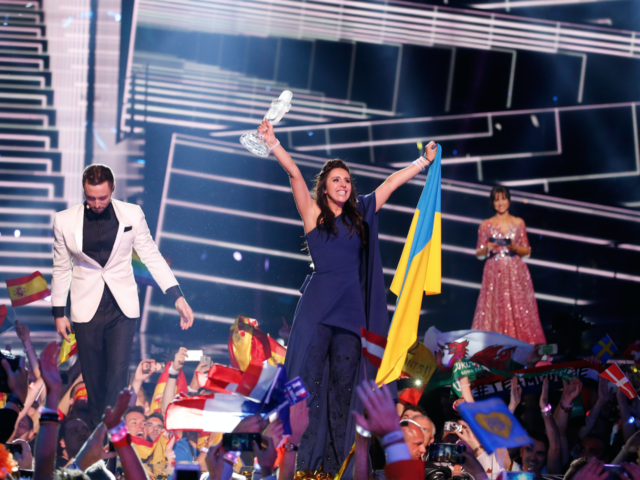(Reuters) – Ukraine’s Jamala struck a surprise gold in the Eurovision Song Contest on Saturday with a song “1944” about war-time deportations of Crimean Tatars by the Soviet Union in one of the most controversial winners in the competition’s history.
In a show known down the years for its playfulness and camp, 32-year-old Jamala struck a sombre tone with her lyrics about strangers coming to “kill you all”, in reference to the forced removal of ethnic Tatars by Josef Stalin during World War 2.
Jamala, herself a Tatar, stood on the Stockholm stage singing “you think you are gods” against a blood-red backdrop.
She said her great-grandmother was one of the Crimean Tatar victims of Stalin who deported the group en masse to Central Asia after accusing them of sympathizing with Nazi Germany. Many of the 200,000 deported died on the way or in exile.
Jamala pleaded for “peace and love to everyone,” when collecting the trophy ahead of Australia in second place and Russia in third spot. Despite being far from Europe, Australia attended the competition for the second time after an invitation from organisers.
While the Eurovision voting has long been tainted by political alliances among competitor countries, songs are not allowed to be political but Jamala’s entry seemed to come close to breaking that rule.
Event organiser, the European Broadcasting Union, said Ukraine’s offering did not contain political speech and therefore did not break Eurovision Song Contest rules.
“The song refers to a historical fact and Jamala makes reference to a story that happened in her family,” EBU Director General Ingrid Deltenre told Reuters after the show.
She said the song referred to what happened in 1944 and not recent events. Crimea was annexed from Ukraine by Russia in 2014.
At a press conference, Jamala appeared to struggle with tears when she talked about a close relative that the song was about.
“I would prefer that all these terrible things did not happen at all to my great-grandmother and I would even prefer this song not to exist,” she said.
Bookmakers had tipped Russia to win the competition followed by Australia and Ukraine at number three.
Russian contestant Sergey Lazarev played down any political implications of Ukraine’s victory.
“I am trying to think that it is all about music and not about politics. We are at a song contest, not a political one,” Lazarev told reporters after the contest was over.
As late as last year, Ukraine decided not to take part in Eurovision with war again ravaging the country as troops take on Russian-backed rebels.
Tatars, a Muslim people from the Black Sea peninsula, opposed the 2014 annexation of Crimea, which followed the overthrow of a Moscow-backed president in Kiev.
Inside the stadium on Saturday, the world’s biggest international music show took place with the audience dancing and partying.
But the hosts of the contests, last year’s winner Mans Zelmerlow and comedian Petra Mede, also struck a serious chord.
“This competition was created in 1956 to unify a continent torn apart by war, and right now Europe is once again facing darker times. That reminds us just how important this evening actually is,” Zelmerlow said. And Mede filled in:
“Because tonight, we set aside any differences we might have, and unite through our love for music,” she said.
The organisers expected more than 200 million to tune in – more viewers than the Super Bowl.
And the competition is reaching ever wider outside Europe with this year’s final being live broadcast for the first time in the United States and China.
One of the most memorable Eurovision winners in recent years was Austrian drag queen Conchita Wurst who won in 2014 with the ballad “Rise Like a Phoenix.”

COMMENTS
Please let us know if you're having issues with commenting.